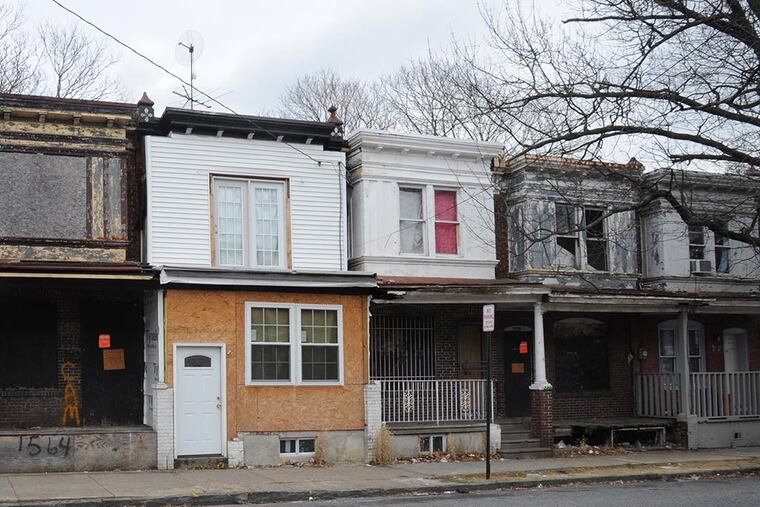County takes over Camden demolition project
Camden's plan to rid its streets of close to 600 vacant and dilapidated buildings, which has stalled in recent months due to problems with the contracts that were awarded, moved out of the hands of city officials Thursday as the Camden County Improvement Authority took control.

Camden's plan to rid its streets of close to 600 vacant and dilapidated buildings, which has stalled in recent months due to problems with the contracts that were awarded, moved out of the hands of city officials Thursday as the Camden County Improvement Authority took control.
The authority has been assisting Camden from the beginning but will now have a lead role via a shared-services agreement.
Since announcing the project last year with much fanfare, city officials have struggled to get it off the ground. The first 62-building phase was put out to bid a second time after attracting no bidders the first time. Last month, the contractor who had signed on for the bulk of the work backed out, citing concerns over asbestos removal as one reason.
The city's decision to award separate contracts for the disconnection of utilities, rather than including the work as part of each demolition job, led to a cumbersome process, city spokesman Vincent Basara acknowledged.
"We welcome the county's involvement," he said Thursday. "We experienced some unanticipated setbacks, and we believe this will streamline the process."
James Blanda, executive director of the CCIA, said Camden officials asked the authority to take on more oversight.
"Demolition projects are not the easiest," Blanda said. "There can be many unexpected elements to it, and if this was a smaller project, I'm sure they would have been able to handle it themselves."
Over the last decade, Camden officials have grown accustomed to ceding control over the day-to-day operations. In 2002, Camden was subject to what was believed to be the biggest municipal takeover in U.S. history, eliminating all authority from the mayor and City Council. Though the takeover ended in 2010, Camden remains impoverished, and its annual budget is heavily dependent on state aid. In 2013, the local police department was disbanded in favor of a county force. Later that year, Gov. Christie announced a state takeover of Camden's schools.
Mayor Dana L. Redd has vowed to reduce the city's pervasive blight by rehabbing or demolishing buildings that are empty and in disrepair, often abandoned by owners who walked away or stopped paying taxes. A survey last year by the nonprofit group CamConnect and the Camden Community Development Association found that close to 15 percent of the nine-square-mile city's structures were vacant, and about 37 percent of city land could be considered empty if 8,000 vacant lots are included.
In October the city began the demolitions, believed to be the largest such project in the state. The 62-building phase is funded by a federal grant. The second phase, the $8 million destruction of 534 remaining structures, will be financed by a bond to be paid off with a tax on city parking lots. Officials said last year that they hoped to have the demolitions finished within 18 months.
City representatives, City Attorney Mark Riondino, and members of the CCIA met numerous times to draw up contracts to draw bidders, Basara said. The houses on the demolition list are divided into five groups, each of which was put out to bid in December as a separate contract.
National Demolition & Recycling of Hamilton, N.J., was awarded all five after bidding a low price for the work - an average of under $13,000 to raze each house. City officials have said teardowns can cost up to $25,000.
Representatives from National Demolition have declined to comment. People with knowledge of the bidding process said the company pulled out of the $6.8 million contract because its officials thought the city had downplayed the extent of the asbestos removal required in many of the properties, and misrepresented other specifications that led the company to underestimate the overall cost. Since then, the Burlington County company Winzinger Inc. has been awarded a contract to raze 101 properties.
The city awarded the first 62 houses to the North Jersey-based Tricon Enterprises, which knocked down a building in Whitman Park after a well-attended news conference in January.
Just six homes have been razed since then. Six other demolitions are underway, Basara said, and 29 additional buildings are ready for demolition.
Blanda, of the CCIA, said the authority would amend the remaining contracts before putting them out to bid, most likely by bundling the utility disconnection work with the rest of the work required at the demolition sites. He said Camden's officials may have wanted to save money by putting the utility disconnections out to bid separately, and also indicated that any asbestos concerns would be addressed in amended contracts.
Blanda said the CCIA would start work right away on putting new contracts together but said that without contractors signed on, it was impossible to say how long the project would take.
"It could be 18 months, but it could be eight months," he said. "Everyone wants to get these units down. The most important thing is to do it right."